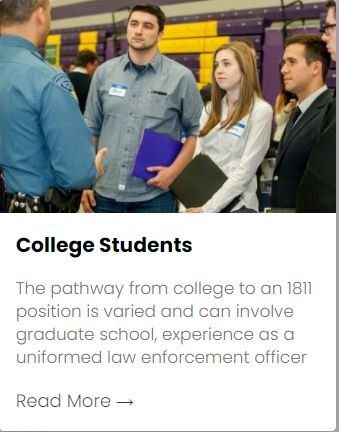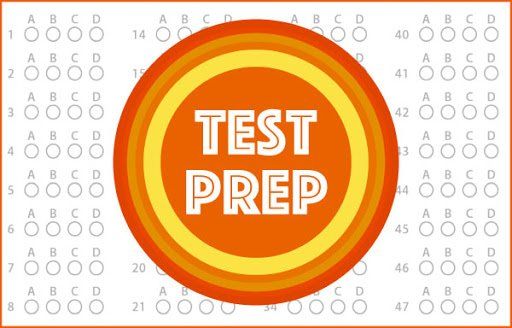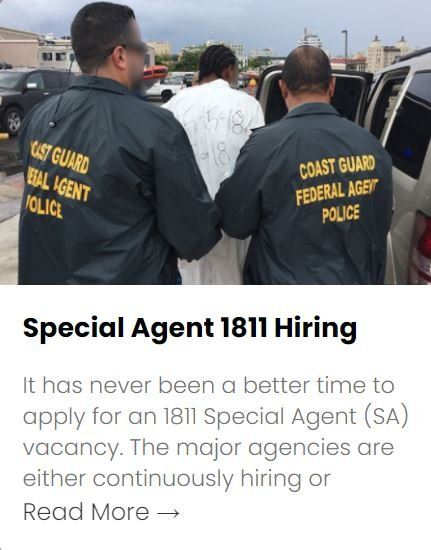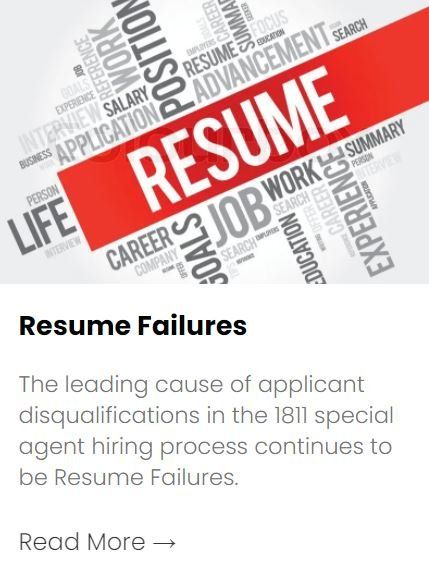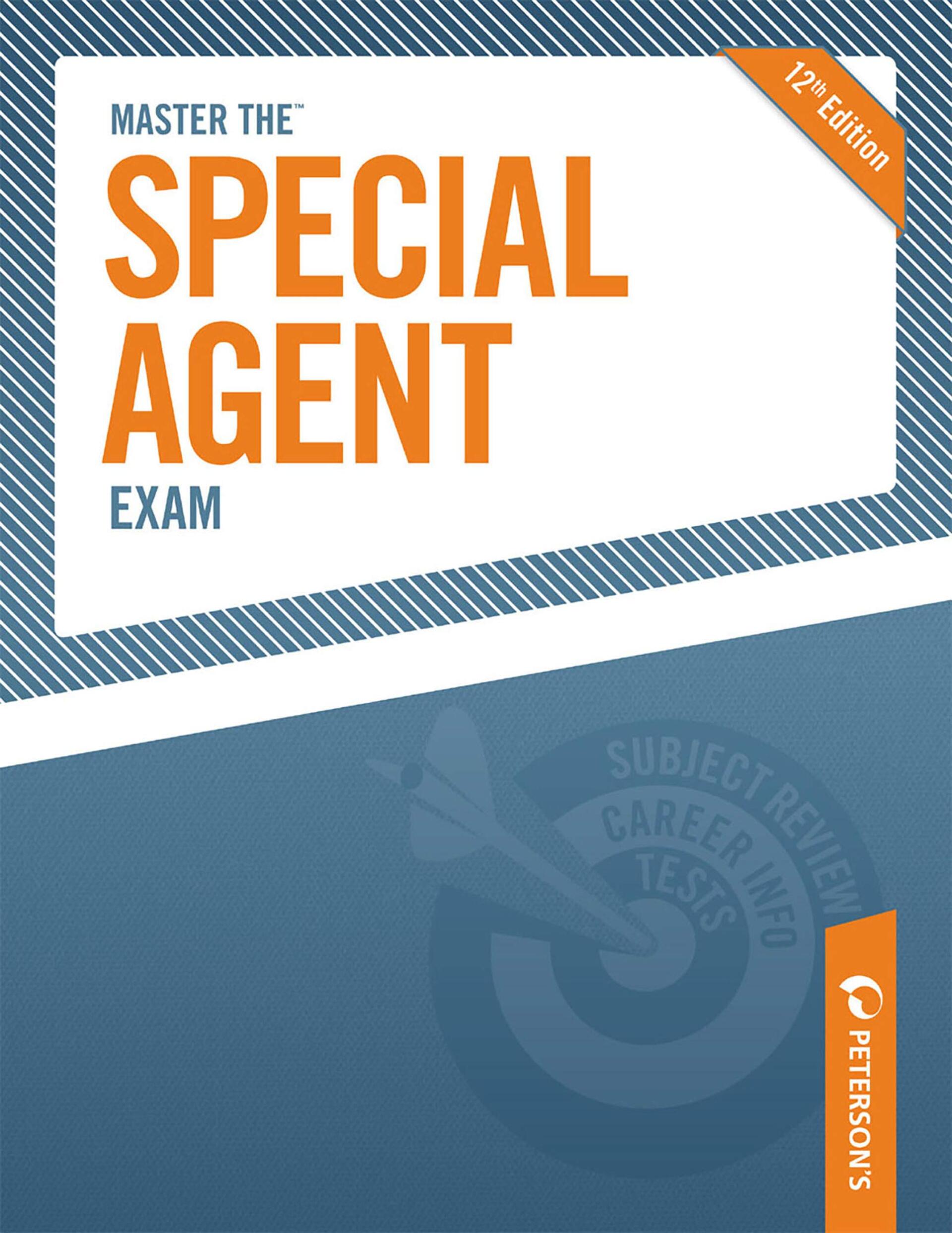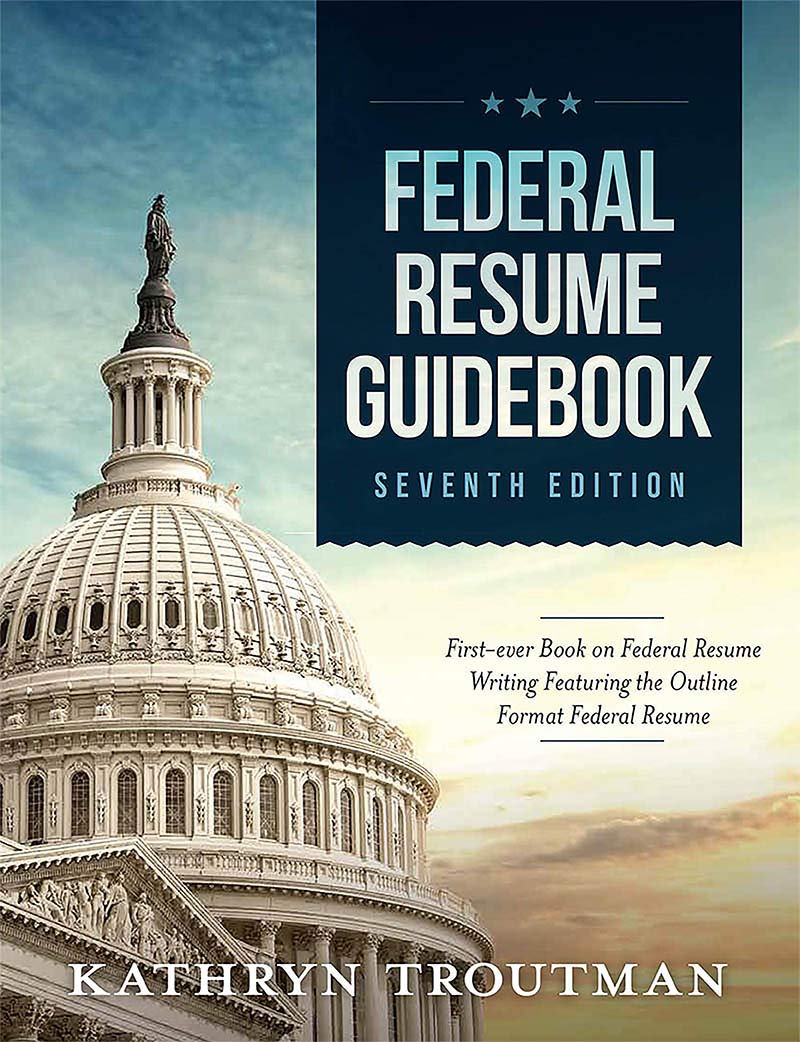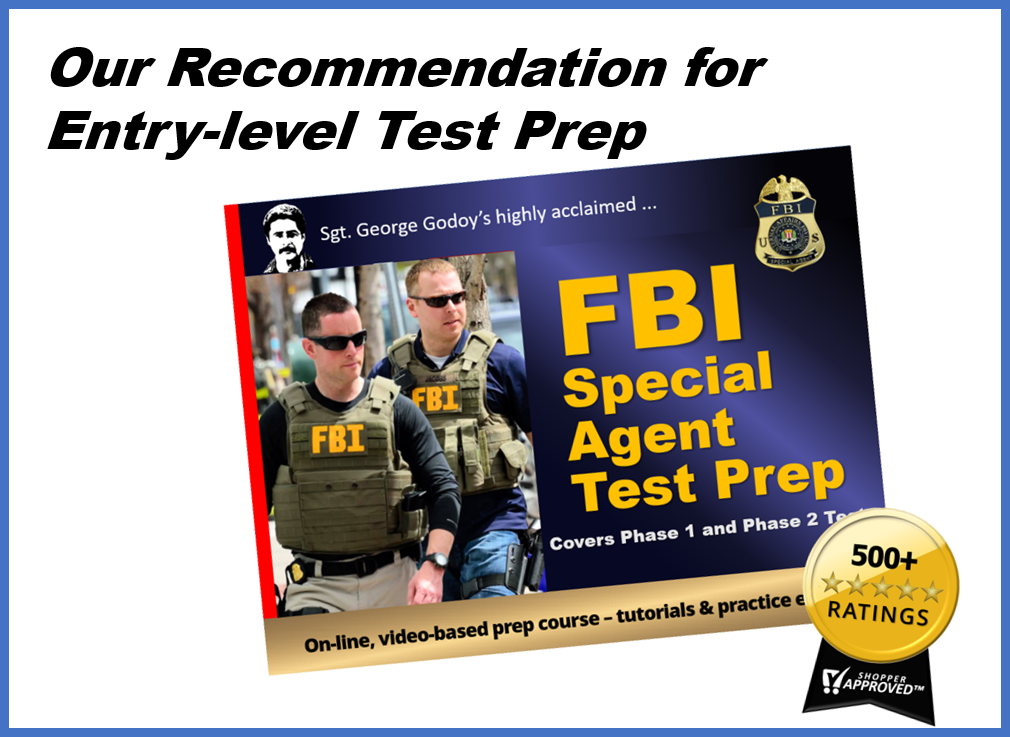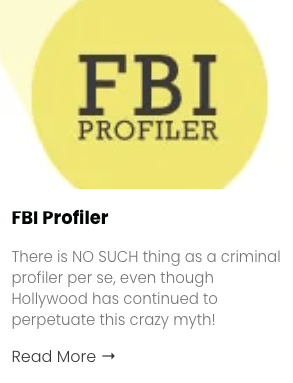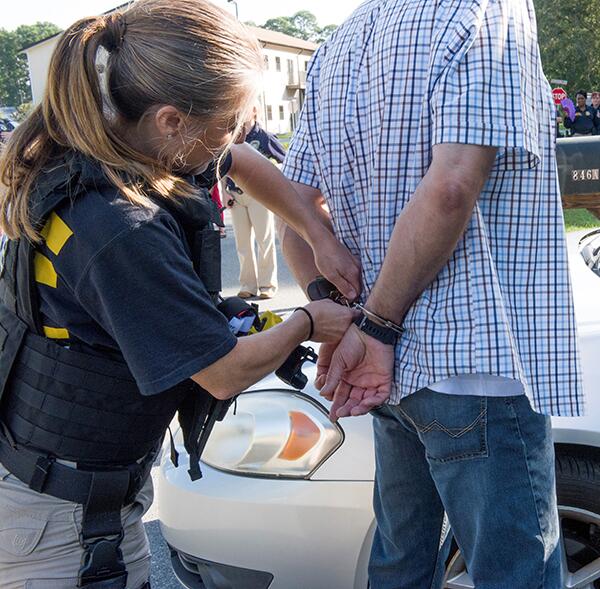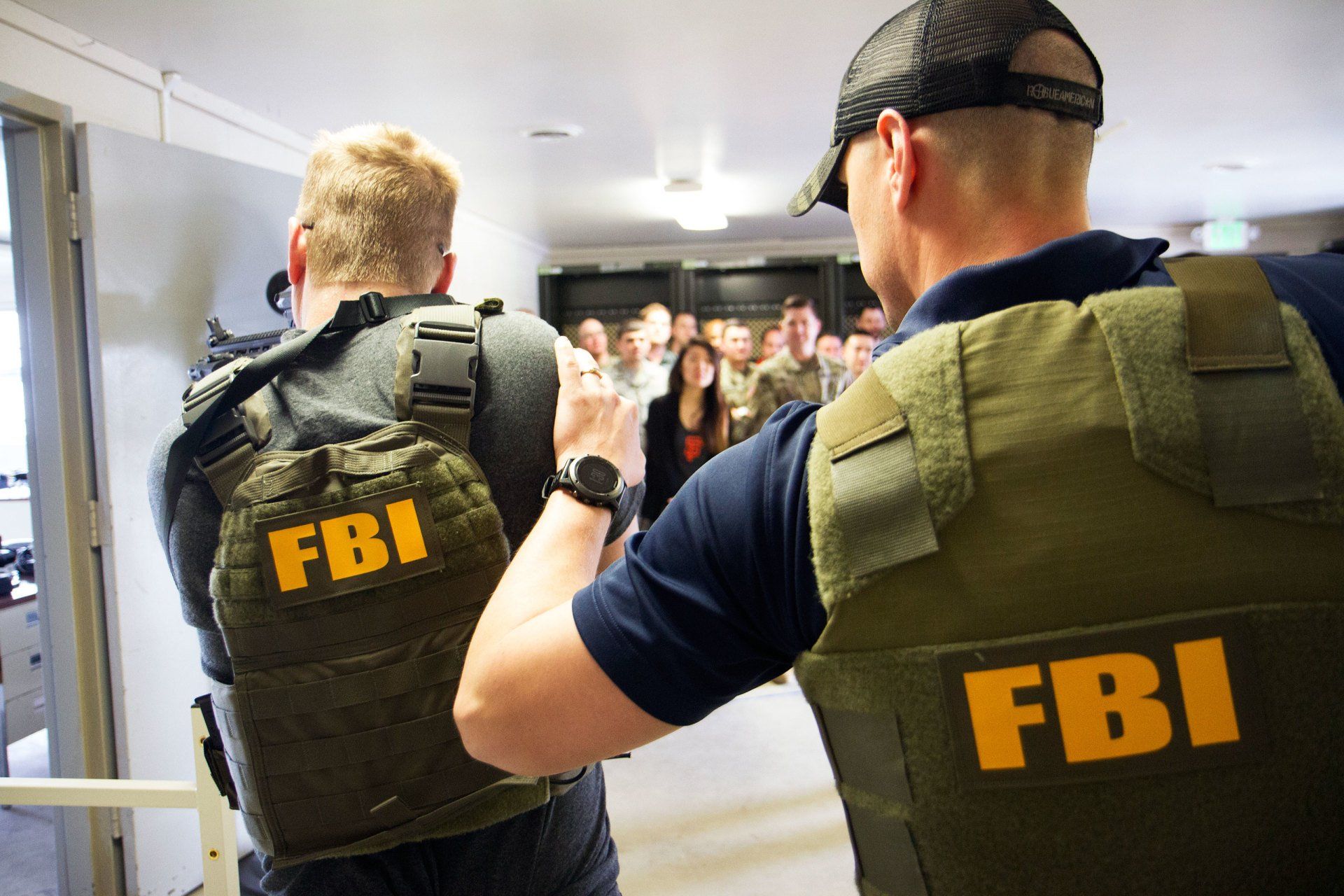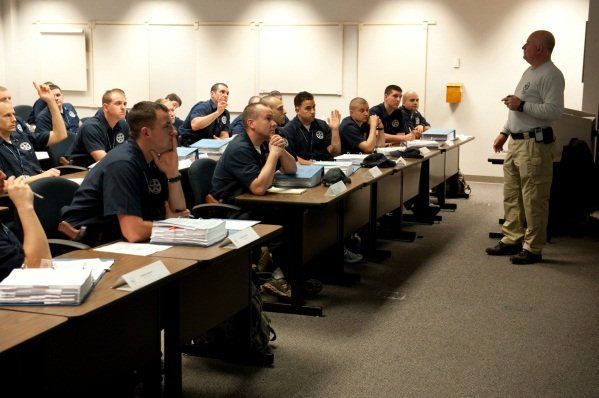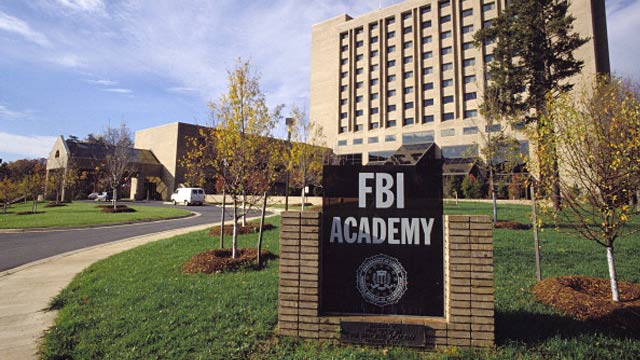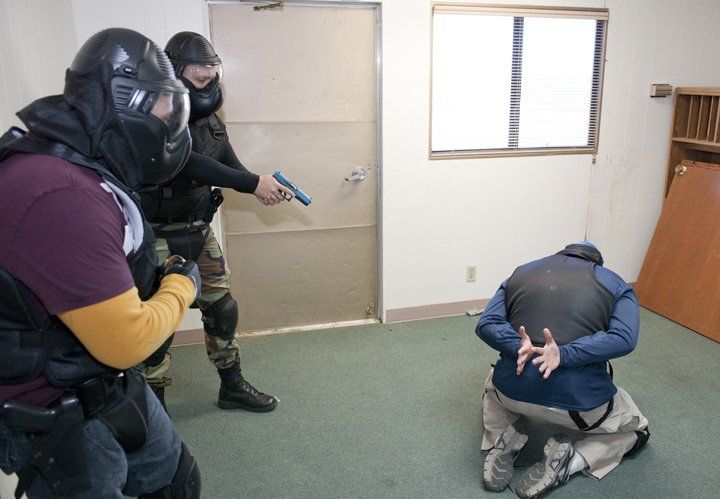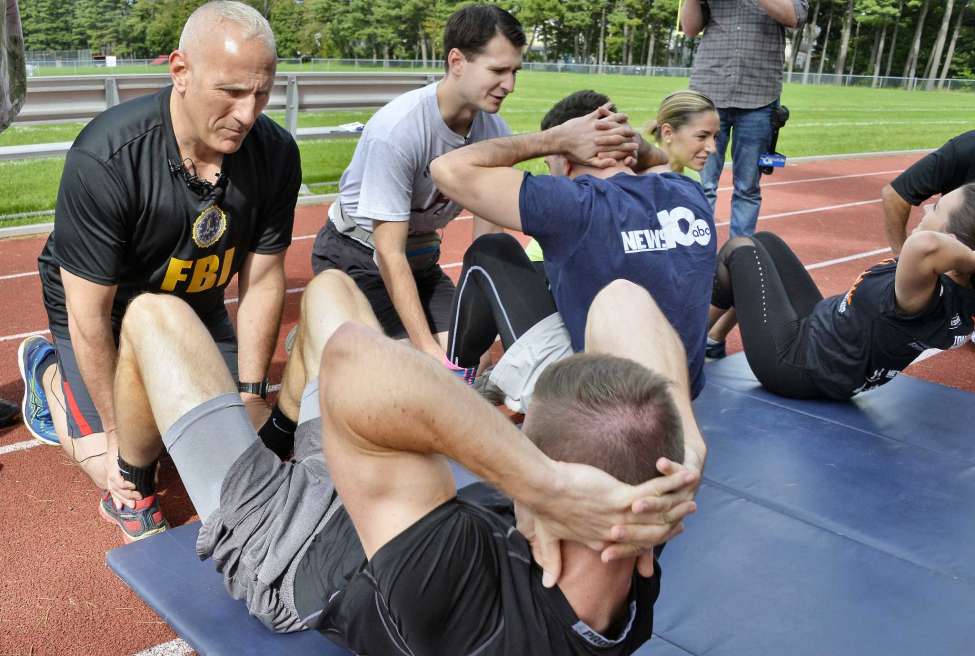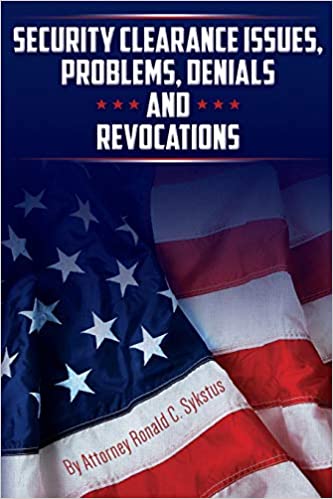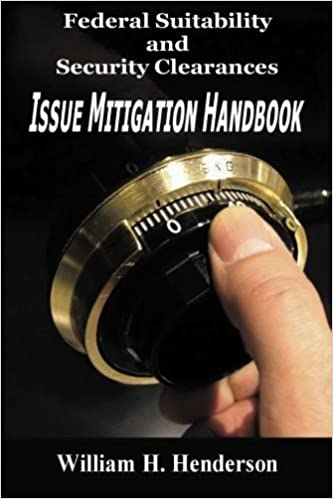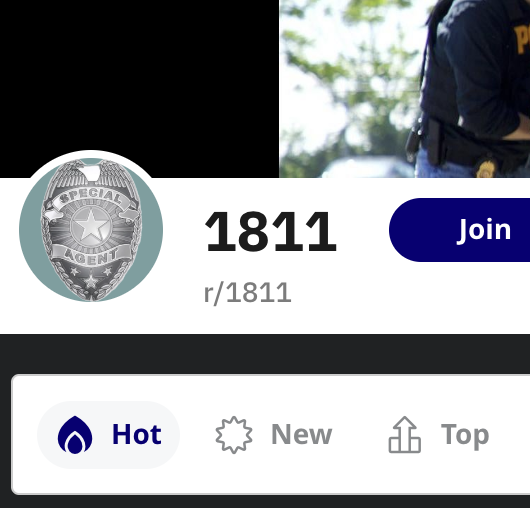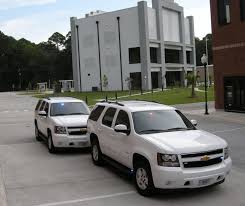Special Agent Hiring Guidance & FAQ
Finding a vacancy and making yourself the best qualified applicant can appear to be quite a challenge at times. Explore this section to learn more.
Special Agent Federal Resume
Critical First Step - Tailor for Federal Govt. Application System
It is critical that you tailor your resume to the federal government application system and thoroughly ignore the typical guidance for private sector resumes. The 1811 resume failure rate is close to 50%! In general, the government application system rewards extensive detail and relevant experience. You should have a robust resume (minimum 2-3 pages in length) in USAJobs that incorporates ALL the advice provided by HR government officials. If you are well qualified, and have repeatedly applied to 1811 vacancies without result, chances are your resume is deficient in critical components. HR will routinely avoid forwarding resumes of qualified candidates because they are not sufficiently detailed to pass later audits. Check out my Resume Failures Blog Post and the below links to resume resources to help draft a proper Curriculum Vitae (CV). You must put in the hard work & develop a detailed resume!
A Special Agent is a federal law enforcement criminal investigator. They are typically categorized in the GS-1811 job series. Special Agents have the statutory authority to carry firearms, conduct searches & seizures, and make arrests. Special Agents work for a number of federal agencies such as Homeland Security Investigations (HSI), Drug Enforcement Administration (DEA), Federal Bureau of Investigations (FBI), and U.S. Secret Service (USSS), etc.
Start
with your
Federal Resume
See this Federal Resume Template & Fed Resume Guide to help you get started.
See the official USAJobs Resume Guide YouTube Video made by HR pros.
Here are some official USAJobs tips & resources on how to build your resume.
See the official Gov. Vets page to learn more about different hiring programs.
Here is another official resume guide posted by DHS that provides simple tips to improve.
See the official NIH Resume guide for additional advice & guidance.
Here is the direct link to the USA Jobs Resume builder. Start your resume draft here!
Federal Govt. Jobs has an excellent Resume Resource Page to help applicants draft resumes.
For new applicants, half the battle is finding the correct entry level vacancies. This 1811 Hiring List link is an amazing resource and will take you to a summary of some of the SA positions that are currently available.
By popular request & recognizing that people learn in different ways; the Special Agent Blog YouTube Channel is now live. The YouTube site consolidates videos into agency Playlists. I have selected useful content.
Online Security
Most applicants appear to be unaware of the basic steps they should take to maintain their online security. The two areas that need vital protection are your credit profile and physical address. Taking preventative measures over a lifetime will provide numerous security benefits during your law enforcement career. Read below post to learn more:

The most competitive special agent applicants are those with degrees AND relevant work experience.
Special Agent INTERNSHIPS
Undergraduates are also HIGHLY encouraged to participate in internships with federal agencies. The DEA, Secret Service, FBI, DSS, HSI, and many OIG agencies all have internship programs, some are even paid. Students that complete internships often gain invaluable experience and professional networks. In many cases, they quickly become the preferred candidates when vacancies are posted and end up with a huge advantage during the application and background process. An internship is also often times creditable work experience. An applicant with limited work experience and no internship is at a huge disadvantage and will likely not even be invited to the interview phase. To learn how to apply for an internship, contact your local agency office directly or view the USAJobs Internship Portal.
Special Agent VACANCIES
Half the battle is finding the right entry level vacancies (GS 5 - 10). As a potential applicant, I would encourage you to sign up for email alerts with the specific agencies you are interested in applying and routinely check their websites for updates. Another option is to go to the USA Jobs Advanced Search page and specifically search for the Criminal Investigation Occupational Series – 1811 (see link below). This will show all special agent vacancies.
Note: Most Office of Inspector (OIG) special agent vacancies are targeted for those who are currently senior special agents (GS 13). In the rare occasion that they post a GS 7-9 entry level job, experience has shown that the internal internship applicants are usually given preference (hint, hint).
The nonprofit Partnership for Public Service recently released a new Federal Internship Finder Tool. This is a fantastic resource for students that are looking to start a career with the federal government. Students and recent Graduates can now see all the different types of entry level programs (i.e. Pathways, Internships, Recent Graduates) in one portal, which saves the hassle of searching dozens of sites. This site also provides great resources for resume writing and applying to federal positions.
*Most* agencies post vacancies here. Pro Tip: Type in "1811" in the Series Search bar to quickly find Criminal Investigator vacancies.
The current applicant shortage is an opportunity for savvy candidates! The FBI applicant pool declined from a peak of 68K to 11,500 (2018).
The Secret Service has started an unprecedented hiring surge for entry level SA positions. Recent college graduates are encouraged to apply.!
Special Agent Automatic Disqualifiers
If you fall into any one of these categories, your chances of becoming a Special Agent are virtually ZERO. Don't waste your time by applying. These are often non-negotiable requirements that cannot be waived:
- Over the age of 37 (Except prior military)
- Non U.S. Citizenship
- Conviction of a felony, sex crime and/or a domestic violence misdemeanor.
- Currently have a federally funded student loan in default.
- Failure to file income tax returns.
- Once holding a security clearance that was revoked.
- Failure to pay court-ordered child support or alimony payments.
Special Agent Hiring Process
With limited exceptions, the application process is incredibly lengthy (average 2 Years) and often exhausting. It can be further disheartening to read forums about how the process is "rigged" in favor of one type of candidate or the other. Please do yourself a solid, take a deep breath and read through the available information on this site. I am constantly amazed to see applicants make the same repetitive mistakes & expect a different result. Don't be that guy/gal!
In general, a person seeking an entry level 1811 position should tactically apply to EVERY position for which they have the best chances of success. After all, did you apply to only one "reach" college after high school? In 2020, qualified entry level candidates have a better than average chance of obtaining a position with the Secret Service. Additionally, the savvy candidate will pursue opportunities with less public agencies that are often overlooked. The current 1811 applicants may be the best qualified candidate for some these vacancies but if you are willing to accept Alaska as your assignment or perhaps an Indian Reservation in Montana; you could be an instant 1811 special agent. The opportunities for the "go-getters" have always been there; remember, I used to be an applicant just like you!
Finally, I cannot stress this enough but your professional networking should involve finding current federal opportunities within these agencies (i.e. uniformed federal officer, staff assistant, forensic examiner, admin specialist, internship) while waiting in the pipeline. In the past three years I have seen support staff from each one of these admin or uniformed positions become special agents within my agency. They simply used their time valuably, gained the early inside track to various vacancy announcements and quickly grabbed opportunities as they became available!
I would also highly advise all applicants to understand the various *types* of vacancy announcements and ensure they are even eligible to apply, to avoid wasting their time. There are many 1811 vacancies that are NOT open for the general public but are reserved for current or former federal employees. Read More at USAJOBS-Eligibility Page. I would also advise applicants to check out the USAJobs National Security Portal for potential entry level positions.
1811 Criminal Investigator Position
USAJobs
Most (but not all) federal agencies post special agent job vacancies at USAJobs.gov.
How to Get Hired?
This is an excellent article in which a supervisory agent clearly lays out the selection process.
OPM 1811 Job Series
This is the official OPM Job Description for the 1811 Criminal Investigator Position and should be reviewed.
1811 Vacancy List
I would recommend applicants regularly check this list to see an overview of 1811 vacancies.
My Interview Experience
Panel Interviews - No Mystery
I applied to several 1811 agencies in order to maximize my chances for success; consequently I completed the Panel Interview process for DEA, DSS, FBI, and HSI. The panel interview process was (and still is) the typical format for most 1811 agencies. Read my Interview Experience Blog Post to learn more.
Special Agent Polygraph
How Federal Polygraphs Really Work
Dreaded & Misunderstood
The polygraph examination is simply a tool to gauge your honesty & suitability as an adult applicant. It is also a subjective process so mistakes can happen (Personally, I failed by 1st DEA poly, passed the second DEA poly and later passed my FBI poly.). I would advise all applicants to be well rested before the polygraph interview & simply answer all questions truthfully (yes, it is that simple). Do NOT read about how to cheat the poly or attempt to use any deception techniques as it will negatively impact your results. In general, as long as you are NOT a spy or criminal, you should be ok. In many instances, you are given a second chance & worst case scenario, you can re-apply and/or apply to another agency without prejudice. I am constantly amazed at the misinformation & rumor that is endlessly debated on various forums. If you must know more, I would simply refer you to the DOJ report titled "Use of Polygraph Examinations in the DOJ" that goes in-depth about the poly and is an official source; which you should disclose as basic research during the interview.
There is always a certain amount of anxiety when preparing to attend an 1811 criminal investigator academy. That is normal! Preparation for your academy starts with carefully reading the orientation packet. Each agency has different policies & procedures for their trainees.
Review My Academy Experience Blog Post to learn more.
Federal Agencies are able to use a variety of Hiring Authorities in order to fulfill their workforce needs. It is important to understand the authorities to determine if you qualify. Below are the common Hiring Authorities used:
Traditional Authority
I. Delegated Examining Unit: Veteran Preference Applies; Open to all U.S. Citizens
II. Merit Promotion: May be used for Federal Employees Only; Other authorities such as Schedule A, Veteran Spouse, Peace Corps may be added if open to the public (i.e. Career Transition Assistance Plan).
III. Direct Hiring Authority (DHA): No veteran preference given, all applicants on an even playing field; Selection of any qualified applicant can be made; Applicants can be considered without applying to vacancy but resume must be received during open announcement period.
Non-Competitive Authority
I. 30 Percent Disabled Veteran: No Job Announcement required; VA documentation required; Qualifications must be met.
II. Schedule A (Individuals With Disabilities): No Job Announcement required; Qualifications met; Proof of disability.
III. Peace Corps (NCE): Applicants must provide proof of eligibility; Qualifications must be met.
IV. Schedule B: Typically used to attract attorney's, law clerks and fill fellowship programs (technical, medical).
V. Military Spouse & Family Member: This enables a hiring manager to non-competitively appoint a military spouse who meets certain criteria to any position in the competitive service for which he or she is qualified.
VI. Veterans Recruitment Authority: Excepted authority, appoint eligible veterans without competition so long as all job qualifications met.
VII. Veterans Employment Opportunity Act of 1998 (VEOA): Allows veterans to apply to announcements that are only open to "current competitive service employees."
Do yourself a favor and ignore the various (often incorrect) explanations posted on forums about the hiring authorities and read through the Official OPM Hiring Authorities Webpage yourself!
General Minimum 1811 Criminal Investigator OPM Qualifications
Below are generally the typical basic qualifications for the criminal investigator (1811) position. - If you clearly do not meet the minimum qualifications, I would advise a candidate to re-evaluate their chances of actually being selected:
1. U.S. Citizen (Non-Negotiable)
2. Be at least 21-23 years of age to be appointed (depends on agency). Special Agent candidates must be appointed prior to their 37th birthday (certain waivers may be available for prior military personnel).
3. Must be able to obtain a Top Secret Security Clearance (more on this later).
4. Must obtain the appropriate medical clearance (No major medical problems).
5. Available for assignment anywhere the agency has offices.
6. Ability to maintain a valid drivers’ license (all special agents are required to operate government vehicles).
7. Register with Selective Service.
8. Pass a Drug Test
9. Be in excellent physical fitness
10. Possess sharp hearing acuity (hearing aids are disqualifying); Distance Vision: 20/20 or better in one eye, 20/40 or better in the weaker eye. If you need glasses or contact lenses to meet these standards, then you should also have distance vision of 20/200 or better in each eye without glasses or contact lenses; Near Vision: 20/30 or better (can be with corrective lenses); Normal color vision; and Are able to carry 45 pounds or more, capable of heavy lifting. Waivers are possible on a case by case basis.
11. Applicants for a Special Agent position must not have been convicted of any felony charge. In accordance with the Lautenberg Amendment to the Gun Control Act, a person convicted of a misdemeanor crime of domestic violence may not possess a firearm. Applicants must be able to certify that they have not been convicted of any such violation, and that they are not otherwise prohibited from possessing firearms.
12. Must not have defaulted on a student loan insured by U.S. Government.
Remember, these are the minimum eligibility qualifications in order to be appointed as a special agent. Every agency additionally has preferred criteria in order to recruit and ultimately select the most qualified applicant.
The Criminal Justice
Degree Question
In today’s job market, the competition to become a special agent is very intense. A recent college graduate with no work experience and simply an undergraduate degree in criminal justice will NOT be competitive (I cannot stress this enough!). The special agent career has evolved dramatically in the 21st century and a number of specialized critical skills are now highly sought. There are many other degrees that will make you just as if not more competitive as an applicant; however, if you choose to pursue a criminal justice degree I would recommend checking out these sites for a list of the best programs:
Most importantly, an undergraduate criminal justice degree from a for-profit college (i.e. University of Phoenix, ITT Tech) will NOT help your chances and is highly discouraged. In my opinion, they are generally low ranked programs (not to mention very expensive) and have reputations as diploma mills. It is cheaper and better to do the same programs at state community colleges & universities.
Criminal Investigator Academic Preferences
Most agencies are NOW looking for candidates with degrees in computer science, information technology, accounting, finance, engineering; and/or foreign language proficiency, law experience (JD), investigative experience, military experience, physical sciences expertise (i.e., biochemistry, forensics). Additionally, certain agencies may value one academic background over another. For example, the IRS Criminal Investigation Division highly values an accounting degree since they mostly deal with tax evasion cases. On the other hand, Army CID and FBI often exclusively hire special agents with computer related degrees in order to specifically staff their Computer Crimes Investigations Unit. Conversely, the Diplomatic Security Service may favorably rank a candidate with a degree in international relations since they have lengthy overseas careers, whereas the DEA may have zero interest in the same applicant. Also, agencies such as HSI have a selection process that treats all degree subjects equally; whereas the FBI intentionally limits their applicant pool by degree background and skills. There is no single answer to this question as it varies at each agency.
Special Agent Competitive Critical Skills
Generally speaking, a candidate with any one of the skill categories listed below would be competitive for most entry level special agent positions. Any person seriously considering this career should strive to obtain the combination of experience listed below (I took this description from one of the major agencies.). Most applicants tend to be in the Diversified Category; consequently, the candidates with the other skills are often moved to the front of the line & get a better chance of being selected.
01 Accounting
02 Finance
03 Computer/IT
To qualify for the Computer Science/Information Technology Critical Skill: Have managed a corporate network; installed & maintained server systems; maintained an ISP P; maintained and monitored performance on a TCP/IP or other protocol network; or maintained and performance tuned servers or IT Information Services.
04 Diversified
To qualify for the Diversified Critical Skill, a candidate must have a BS or BA degree in any discipline, plus three years of full-time work experience, or an advanced degree accompanied by 2 years of full-time work history.
(An applicant with a 4-year criminal justice degree and some work experience would be in this category.)
05 Language
The following is a list of language skills that are currently deemed critical: Arabic, Chinese – all dialects, Farsi, Hebrew, Hindi, Japanese, Korean, Pashtu, Punjabi, Russian, Spanish, Urdu, and Vietnamese. Also, majoring in any super critical foreign language (i.e., Arabic or Chinese) wouldn’t be a bad idea as are in constant demand.
06 Intelligence
To qualify for the Intelligence Critical Skill, a candidate must possess two years of substantial, full-time work experience in an intelligence area. Candidates who have undergraduate or advanced degrees in International Studies, International Finance, or a closely related discipline would also qualify.
07 Law
08 LEO
To qualify for the Law Enforcement Critical Skill, a candidate must have at least two years full-time investigative experience in law enforcement.
09 Military
10 Sciences
To qualify for the Science Critical Skill, a candidate must have a degree in a scientific field such as Biology, Biochemistry, Chemistry, Forensics, Mathematics, Medical Specialties, Nursing, Physics, etc.
11 Engineering
To qualify for the Engineering Critical Skill, a candidate must have a degree in an Engineering related discipline. A degree in Architecture would also qualify.
Work Experience
I cannot stress this enough but all applicants should be working in a position that gives them creditable work experience. Rather than waiting tables or working as a cashier to pay the bills, I highly encourage applicants to find and accept an entry level federal position . Virtually all federal law enforcement agencies have support positions such as uniformed officer, evidence custodian, surveillance team member, technical officer, classified courier, mission support, investigative analyst, etc. By working in these positions, a graduate is able to receive creditable work experience while simultaneously earning retirement service time.
Special Agent
Physical Fitness
Physical fitness examinations are a non-negotiable component of most hiring processes within the federal law enforcement community. I highly encourage all applicants to routinely practice and take the specific physical fitness exam outlined by the agency to which you are applying. It is important that you practice this fitness exam in the proscribed order so as to get acclimated with the required exertion . Failure to pass the physical fitness test is one of the leading causes of disqualification in the special agent screening process!
Physical Fitness is part of a true special agent's lifestyle!
Narcotics Abuse
A Great Special Agent Disqualifier
The abuse of both legal and illegal narcotics will likely be an instant disqualifier. Additionally, ongoing use of marijuana (ie within 2 years) is typically not looked upon favorably, regardless of its legal status in your state. The best advice for serious candidates is to avoid this lifestyle and/or stop immediately if want to have a shot at a law enforcement career.
Top Secret Background Investigation
Fact vs. Rumor
Security Clearance Podcast : Listen to this official podcast that helps dispel the rumors and myth behind federal background investigations.
Note: Having a current security clearance will NOT help you get an interview quicker; however, it may expedite the background process.
Background FAQ: Read about the background investigation process from the Defense Counterintelligence & Security Agency (DCSA). Read More.
After you complete the initial application and interview process & receive a conditional offer of employment as a special agent, the next step is to begin the background investigation process. Generally speaking, all candidates must receive or be eligible for a Top Secret Clearance before they can begin employment.
As soon as the agency you applied to receives a complete set of background investigation forms, the the hiring agency will assign a background investigator and commence with your background investigation. You will be contacted by the office that is processing your background to schedule your interview, drug test, and polygraph examination. In the next phase of the process, the investigators will perform extensive records checks (e.g., credit checks, police records checks, etc.), and will interview current and former colleagues, neighbors, friends, professors, etc.
Be truthful. If you foresee problems that may arise during the background process, your best option is to be forthcoming and honest; candor is your best friend. I cannot stress this enough! Any attempts to conceal negative information will likely result in dismissal from the application process. USAJobs Backgrounds
The SF-86 is a comprehensive form that a potential applicant will need to fill out in order to start the application process. Take a look at the form and start collecting the information in advance to avoid delays. The Defense Counter - intelligence and Security Agency (DCSA) is now the ultimate authority for federal background investigations. Review the DCSA Official Website to obtain the most accurate & updated information about federal background investigations.
Read
Additional References Security Clearances
Some applicants simply have complex issues in their background and require additional guidance. There are a few publications available (referenced below) to further research the federal background investigation process. If you are in this category, it will take additional effort on your part to navigate these issues ethically and without legal consequences. Do your research and keep in mind that some random dude on an online forum (who is likely just another applicant) is not the best source of advice on any topic.
Security Clearance
Attorney Ronald Sykstus
Access Granted
SA Kevin Crane
Issue Mitigation
Consultant
Commercial Career Sites Buyer Beware
Type in "special agent" and you are likely to end up with a "myraid" of sites by various commercial entities peddling you all forms of nonsense, with the ultimate goal of making money. Some like "balancecareers" have done a marginally decent job of putting together basic information (albeit with errors); others like "careerexplorer" and "zippia" (also geteducated; study; Excite) are just plain junk that have cut & pasted generic information. Often you might see an article (ms.jd)or two (princeton) with some legit sounding advice; more often than not it is similarly superficial. Some even start off as having legitimate content but soon become outdated (FedLeo), irrelevant or or just plain garbage (i.e. deablog). Remember, most of these commercial sites are often designed by paid employees who are trying to build content concerning a wide array of careers. Virtually none of these sites are authored by *actual* special agents. Similarly, the "interview coach" scam has appeared to have taken off and I would carefully vet before selecting their services.
The "Veteran's Preference" Debate
There a number of virulent forums where rejected applicants will claim there is absolutely no way to get hired as an 1811 without military experience and subsequent "Veteran's Preference" points. This is pure fiction.
If you have the aptitude, skills and
desire to serve your country, the military is
indeed a great way to gain relevant work experience for any career. Upon an honorable discharge, you will have several available benefits (i.e. GI Bill, VA Loans, Medical, etc.). Joining the military after high school (Enlisted Corps) or via a college program (Officer Corps) is a challenging & rewarding experience, and should be sought out on its own merits.
However, you can also gain
creditable work experience (key word folks) with an accounting background, high demand IT skills or even a critical language. My academy class had a mix of backgrounds (i.e., teachers, CPAs, military, LEO, lawyers, nurse, counselor). The 1811 workforce is composed of a
compilation of professions and great candidates from ALL backgrounds go on to become SAs!
Special Agent Online
Blogs and Forums
There are four major online blogs in which users share information & advice about the law enforcement hiring process. Like anything in life, use your judgment in accepting this information. Unfortunately, there truly are a number of unstable personalities that regularly post junk information and endlessly quibble over stupid details. Oftentimes it is applicants or rejected candidates sharing "rumor intelligence." Additionally, I have noticed that most posters aren't even special agents and their advice is usually not credible.
Criminal Investigator OPM Job Description
Familiarize yourself so you understand the scope of this position!
This series covers positions which supervise, lead, or perform work involving planning, conducting, or managing investigations related to alleged or suspected criminal violations of Federal laws. The work involves:
- recognizing, developing, and presenting evidence to reconstruct events, sequences, time elements, relationships, responsibilities, legal liabilities, and conflicts of interest;
- conducting investigations in a manner meeting legal and procedural requirements; and
- providing advice and assistance both in and out of court to the U.S. Attorney’s Office during investigations and prosecutions.
Work in this series primarily requires knowledge of criminal investigative techniques, rules of criminal procedures, laws, and precedent court decisions concerning the admissibility of evidence, constitutional rights, search and seizure, and related issues in the conduct of investigations.
Criminal investigative work is characterized by the types and scope of crimes investigated and the organization and sophistication of the criminals. Additional characteristics of criminal investigative work include: planning and conducting investigations extending over protracted periods of time; assignments made primarily on a referral or case basis; and an emphasis on identifying and apprehending individuals for criminal prosecution. During the course of their careers, criminal investigators may rotate through various assignments to include protective details, asset forfeiture investigations, and multi-jurisdictional task forces.
The basic title for positions in this series is Criminal Investigator .
General Occupational Information:
Criminal investigators conduct investigations of alleged or suspected criminal violations of Federal laws. The Federal statute or law which may have been violated does not determine whether a position should be classified in this series. The actual process and the knowledge and skills used to investigate crimes determine the appropriate series of the position. Classification into the 1811 series should not be an automatic process but should be based on the work of the individual position.
Work requires knowledge of:
- pertinent statutes, regulations, policies, and guidelines, including the Code of Federal Regulations or the Uniform Code of Military Justice;
- Federal Rules of Criminal Procedures, Federal Sentencing Guidelines, and Federal guidelines on the conduct of criminal investigations;
- criminal investigative techniques, such as protective surveys and assignments, surveillance, & undercover work;
- the evidence required to prove a crime was committed;
- the jurisdiction of various agencies;
- sources of information and how to develop them (e.g., informants, surveillance, and undercover work);
- electronic countermeasures and the latest technological advances used by criminals and investigators;
- decisions and precedent cases involving, but not limited to, rules of evidence, search and seizure, and detention and arrest.
OPM Criminal Investigator
Some criminal investigators perform or oversee undercover assignments as a regular and recurring part of their assigned duties. Criminal investigator positions will normally be found in organizations whose primary purpose includes functions typically performed by criminal investigators, such as organizations responsible for performing inspection, compliance, enforcement, prevention, or deterrence functions.
Criminal investigations are influenced by a number of legal and technological factors including:
- sophistication and complexity of electronic and technological devices used by the criminal element;
- globalization of the economy and businesses;
- changing policies and priorities of prosecuting officials, courts, and administrations;
- changing composition and diversity of the criminal element (e.g., diverse socio-economic, ethnic, transnational, and organized crime groups); and
- domestic and international terrorism.
Major Criminal Investigation Areas
Criminal investigators may investigate one or more different types of crime. Some of the major criminal investigation areas include:
- financial and electronic crimes such as money laundering, identity theft, telecommunication fraud, and currency violations;
- fraud (i.e., deliberate deception to secure unlawful gains);
- smuggling of items or individuals such as narcotics, firearms, aliens, or protected species;
- strategic crimes such as treason, terrorism, or violations of international agreements (e.g., on arms and technology export);
- environmental crimes; and
- health-related crimes such as intentional distribution of adulterated food.
Distinguishing Criminal Investigation from Other Occupational Series:
Employees in other occupations, both in this job family and in other families and occupational groups, may use some of the tools and techniques used in criminal investigations work. For example, police officers and detectives serve warrants, travel across state lines, and contact local and State authorities to obtain and/or provide background information on suspects. Work in the Police Series, 0083, primarily focuses on crimes committed on Federal property such as breaking and entering, larceny, willful damage of government and private property, aggravated assault, and illegal possession of controlled substances. In contrast, criminal investigators are not typically concerned with independent individuals or small, local groups of individuals committing crimes on Federal property unless they are germane to larger investigations. Rather, 1811-Criminal Investigators focus on suspected major offenses or violations of Federal laws where the investigative assignment requires an extended period of time, i.e., days, weeks, or months, for completion.
